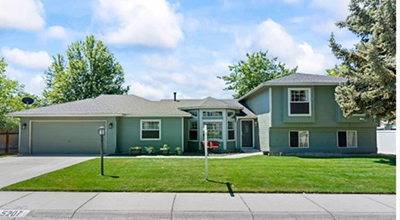
Homebuyer Income Soars in Housing Hotspots

(A house for sale in Boise, Idaho (courtesy Redfin, Seattle.)
If you build it, they will come; and they’ll bring buying power (and they’ll need it, too).
Redfin, Seattle, said its analysis of mortgage data found homebuyer incomes soared in pandemic boomtowns such as Boise, Idaho; Austin, Texas; and parts of Florida, largely due to remote workers moving in from pricey job centers.
The outsized income increases in those places–all popular migration destinations–are due largely to relocating remote workers with high hometown salaries. An influx of people moving in also intensified competition for a limited supply of homes, making it so high-income local buyers were most likely to successfully compete with out-of-towners. Affluent out-of-towners have contributed to rapidly rising home prices in many of those metros, pricing out many local buyers with lower incomes. The average out-of-towner moving to Miami in 2021, for instance, had 25% more to spend on a home than the average local, and newcomers to Phoenix had 21% more.
“For white-collar workers earning high salaries, remote work is a huge financial boon. It enables them to move from a tech center like San Francisco to a more affordable part of the country like Boise or Salt Lake City, get more home for their money and save some for a rainy day,” said Redfin Senior Economist Sheharyar Bokhari. “It can have the opposite effect on locals in those destinations–especially renters–who are watching from the sidelines as home prices skyrocket while their income stays mostly the same.”
Nowhere was that more apparent than in Boise. The typical Boise homebuyer earned $98,000 in 2021, up 24.1% from 2019, the biggest homebuyer income increase of the 100 most populous U.S. metros. Home prices shot up over twice as fast as homebuyer incomes in Boise, rising 53% to $485,000 from December 2019 to December 2021.
Boise is followed by several other pandemic-fueled migration hotspots: Austin, a quartet of Florida metros (Cape Coral, North Port, West Palm Beach and Miami), Phoenix, Stockton, Calif., Tacoma, Wash., and Salt Lake City. In all of those places, homebuyer income growth was more than double the nationwide average of 6.8%. Prices rose 48% in both Austin and Cape Coral. Home-price growth outpaced homebuyer income growth in all 10 metros on this list, with prices rising more than 30% throughout the pandemic in each one.
“Partly because of soaring home prices, Phoenix and Miami have some of the highest inflation rates in the country,” Bokhari said. “That will eventually diminish the financial advantage of moving to these places for out of towners. High inflation also cuts into budgets for locals, who are spending more on things like food and fuel and saving less for an eventual down payment.”
And yet, while local incomes rose and home prices skyrocketed in 2021, Redfin said housing markets in many of those pandemic boomtowns are faltering as high mortgage rates and unsustainable price growth tame demand.
Boise, Austin, Cape Coral, North Port, Phoenix and Tacoma are among the 20 housing markets that cooled fastest in the first half of 2022, Redfin reported. And Boise, Cape Coral, North Port, West Palm Beach, Miami, Stockton and Salt Lake City are among the 25 housing markets most susceptible to home-price declines if the U.S. enters a recession. But Bokhari noted even though they’re susceptible to a recession-driven downturn, these places are unlikely to see housing-market crashes precisely because homebuyers there have relatively high incomes.
“People are still moving in from California and they still have enough money to buy nice homes in desirable neighborhoods, sometimes with all cash,” said Austin Redfin agent Gabriel Recio. “But the days of homes selling for 25% over asking price with multiple offers are over. Buyers are no longer as eager now that mortgage rates are up and there’s buzz in the air about the slowing housing market. Local buyers–and even buyers coming from out of town–now have a chance to take their time and buy a home at asking price or even under asking price.”
However, while homebuyer income rose during the pandemic in 94 of the 100 most populous U.S. metros, it fell slightly in San Francisco (-1.5% from 2019 to 2021) and Baton Rouge, La. (-1.2%). Homebuyer income fell in San Francisco for much the same reason it rose so much in popular migration destinations: Remote workers with high salaries left expensive coastal cities for more affordable areas during the pandemic.
